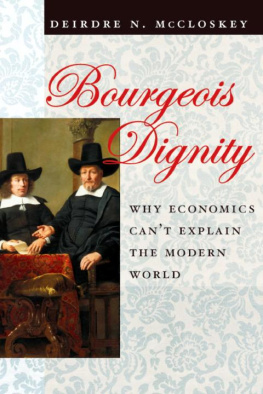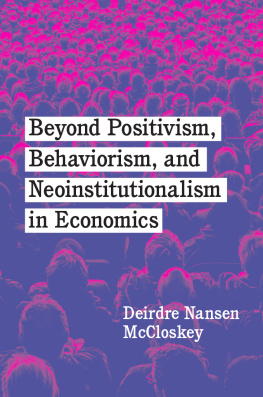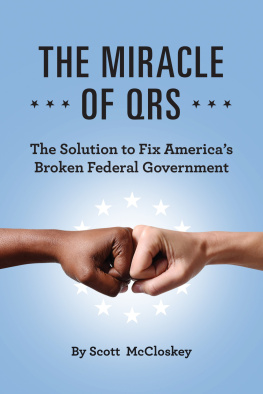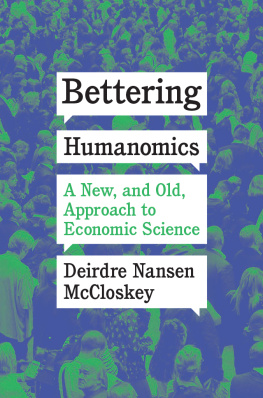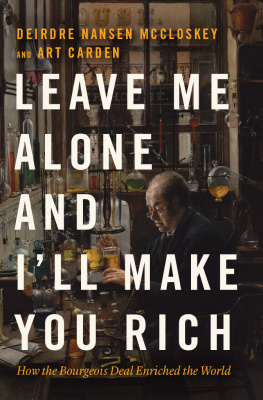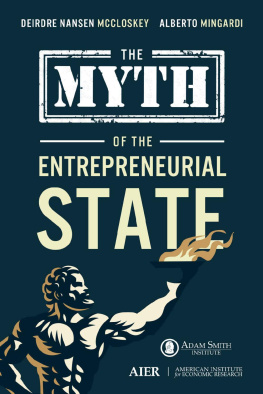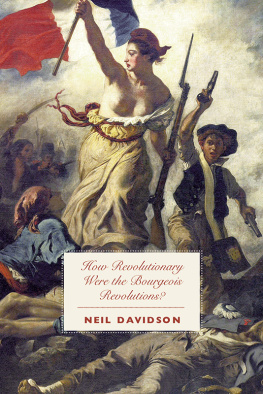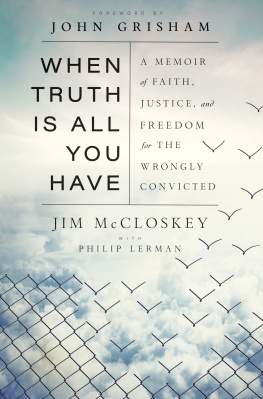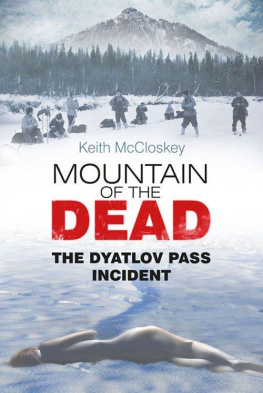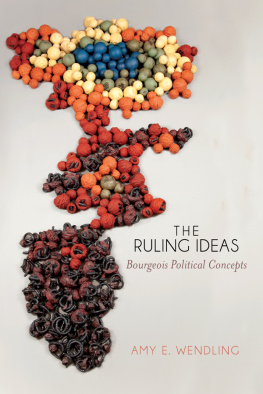Deirdre N. McCloskey - Bourgeois Dignity: Why Economics Cant Explain the Modern World
Here you can read online Deirdre N. McCloskey - Bourgeois Dignity: Why Economics Cant Explain the Modern World full text of the book (entire story) in english for free. Download pdf and epub, get meaning, cover and reviews about this ebook. year: 2010, genre: Politics. Description of the work, (preface) as well as reviews are available. Best literature library LitArk.com created for fans of good reading and offers a wide selection of genres:
Romance novel
Science fiction
Adventure
Detective
Science
History
Home and family
Prose
Art
Politics
Computer
Non-fiction
Religion
Business
Children
Humor
Choose a favorite category and find really read worthwhile books. Enjoy immersion in the world of imagination, feel the emotions of the characters or learn something new for yourself, make an fascinating discovery.
- Book:Bourgeois Dignity: Why Economics Cant Explain the Modern World
- Author:
- Genre:
- Year:2010
- Rating:4 / 5
- Favourites:Add to favourites
- Your mark:
- 80
- 1
- 2
- 3
- 4
- 5
Bourgeois Dignity: Why Economics Cant Explain the Modern World: summary, description and annotation
We offer to read an annotation, description, summary or preface (depends on what the author of the book "Bourgeois Dignity: Why Economics Cant Explain the Modern World" wrote himself). If you haven't found the necessary information about the book — write in the comments, we will try to find it.
Bourgeois Dignity: Why Economics Cant Explain the Modern World — read online for free the complete book (whole text) full work
Below is the text of the book, divided by pages. System saving the place of the last page read, allows you to conveniently read the book "Bourgeois Dignity: Why Economics Cant Explain the Modern World" online for free, without having to search again every time where you left off. Put a bookmark, and you can go to the page where you finished reading at any time.
Font size:
Interval:
Bookmark:

DEIRDRE N. McCLOSKEY
1904 -1978
Model and mentor
Pars enim scientia est, scire quid nesco
A big change in the common opinion about markets and innovation, I claim, caused the Industrial Revolution, and then the modern world. The change occurred during the seventeenth and eighteenth centuries in northwestern Europe. More or less suddenly the Dutch and British and then the Americans and the French began talking about the middle class, high or low-the "bourgeoisie"-as though it were dignified and free. The result was modern economic growth.
That is, ideas, or "rhetoric," enriched us. The cause, in other words, was language, that most human of our accomplishments.' The cause was not in the first instance an economic /material change-not the rise of this or that class, or the flourishing of this or that trade, or the exploitation of this or that group. To put the claim another way, our enrichment was not a matter of Prudence Only, which after all is a virtue possessed by rats and grass, too. A change in rhetoric about prudence, and about the other and peculiarly human virtues, exercised in a commercial society, started the material and spiritual progress. Since then the bourgeois rhetoric has been alleviating poverty worldwide, and enlarging the spiritual scope of human life. The outcome has falsified the old prediction from the left that markets and innovation would make the working class miserable, or from the right that the material gains from industrialization would be offset by moral corruption.
In other words, I argue that depending exclusively on materialism to explain the modern world, whether right-wing economics or left-wing historical materialism, is mistaken. The two books to follow will make the positive case for a rhetorical, or ideological, cause of our greatly enlarged human scope. Here the case is negative. The usual and materialist economic histories do not seem to work. Bourgeois dignity and liberty might.
Such a theme is old-fashioned, as old as eighteenth-century political theory. Or it is new-fashioned, as new as twenty-first-century studies of discourse. Either way, it challenges the usual notions about "capitalism." Most people harbor beliefs about the origins of the modern economy that historical and economic science have shown to be mistaken. People believe, for example, that imperialism explains European riches. Or they believe that markets and greed arrived recently. Or they believe that "capitalism" required a new class or a new self-consciousness about one's class (as against a new rhetoric about what an old class did). Or they believe that economic events must be explained "ultimately," and every single time, by material interests. Or they believe that it was trade unions and government protections that have elevated the working class. None of these is correct, as I hope to persuade you. The correct explanation is ideas.
I've tried to write a book engaging the educated reader. But the argument has to use the findings of economic and historical specialists, and to get down into some of the details of their arguments. I tell the story of modern economic growth, summarizing what we have thought we knew from 1776 to the present about the nature and causes of the wealth of nations-how we got refrigerators and college degrees and secret ballots. The book tests the traditional stories against the actually-happened, setting aside the stories that in light of the recent findings of scientific history don't seem to work very well. A surprisingly large number of the stories don't. Not Marx and his classes. Not Max Weber and his Protestants. Not Fernand Braudel and his Mafia-style capitalists. Not Douglass North and his institutions. Not the mathematical theories of endogenous growth and its capital accumulation. Not the left-wing's theory of working-class struggle, or the right-wing's theory of spiritual decline.
Yet the conclusion is in the end positive. As the political scientist John Mueller put it, capitalism-or as I prefer to call it, "innovation"-is like Ralph's Grocery in Garrison Keillor's self-effacing little Minnesota town of Lake Wobegon: "pretty good."2 Something that's pretty good, after all, is pretty good. Not perfect, not a utopia, but probably worth keeping in view of the worse alternatives so easily fallen into. Innovation backed by liberal economic ideas has made billions of poor people pretty well off, without hurting other people.' By now the pretty good innovation has helped quite a few people even in China and India. Let's keep it.
The Big Economic Story of our times has not been the Great Recession of 2007-2009, unpleasant though it was. And the important moral is not the one that was drawn in the journals of opinion during 2009 -about how very rotten the Great Recession shows economics to be, and especially an economics of free markets. Failure to predict recessions is not what is wrong with economics, whether free-market economics or not. Such prediction is anyway impossible: if economists were so smart as to be able to predict recessions they would be rich. They're not. No science can predict its own future, which is what predicting business cycles entails. Economists are among the molecules their theory of cycles is supposed to predict. No can do-not in a society in which the molecules are watching and arbitraging.4
The important flaw in economics, I argue here, is not its mathematical and necessarily mistaken theory of future business cycles, but its materialist and unnecessarily mistaken theory of past growth. The Big Economic Story of our own times is that the Chinese in 1978 and then the Indians in 1991 adopted liberal ideas in the economy, and came to attribute a dignity and a liberty to the bourgeoisie formerly denied. And then China and India exploded in economic growth. The important moral, therefore, is that in achieving a pretty good life for the mass of humankind, and a chance at a fully human existence, ideas have mattered more than the usual material causes. As the economic historian Joel Mokyr put it recently in the opening sentence of one of his luminous books, "Economic change in all periods depends, more than most economists think, on what people believe."5 The Big Story of the past two hundred years is the innovation after 1700 or 1800 around the North Sea, and recently in once poor places like Taiwan or Ireland, and most noticeably now in the world's biggest tyranny and the world's biggest democracy. It has given many formerly poor and ignorant people the scope to flourish. And contrary to the usual declarations of the economists since Adam Smith or Karl Marx, the Biggest Economic Story was not caused by trade or investment or exploitation. It was caused by ideas.
Innovation backed by ideology, then, promises in time to give pretty good lives to us all. Left and right tend to dismiss the other's ideology as "faith." The usage devalues faith, a noble virtue required for physics as much as for philosophy, and not at all irrational. But maybe both sides are correct. A socialist maintains her faith in governmental planning despite the evidence that it doesn't work to the benefit of the poor. A conservative maintains his faith that what's good for the military-industrial complex is good for the country despite the evidence that it impoverishes and coarsens the people.
Font size:
Interval:
Bookmark:
Similar books «Bourgeois Dignity: Why Economics Cant Explain the Modern World»
Look at similar books to Bourgeois Dignity: Why Economics Cant Explain the Modern World. We have selected literature similar in name and meaning in the hope of providing readers with more options to find new, interesting, not yet read works.
Discussion, reviews of the book Bourgeois Dignity: Why Economics Cant Explain the Modern World and just readers' own opinions. Leave your comments, write what you think about the work, its meaning or the main characters. Specify what exactly you liked and what you didn't like, and why you think so.

